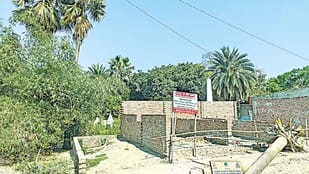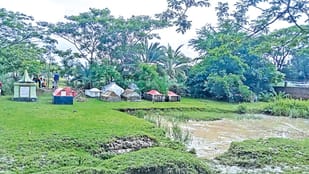Encroached and evicted: The vanishing Rakhines of Bangladesh

For centuries, the Rakhine community has called the shores of Patuakhali and Barguna home. They were the first settlers there, long before the area became part of the former Bakerganj district, and later Barishal. The very land that the Rakhines once regarded as their mark of existence is now shrinking from under their feet.
Their villages are vanishing, their temples and burial grounds are being seized, and their lands are increasingly claimed by ruthless encroachers. What was once a thriving population of over 50,000 in the area, has dwindled to barely 2,500, leaving behind a legacy of dispossession and a future hovering on the edge of extinction.
Rakhine's ancestral legacy
Before the arrival of the Rakhines on the southernmost coastal belt of Barishal in 1784, the area was an uninhabited, dense forest teeming with wild animals. They transformed this region into arable farmland. Whatever land they cleared and cultivated was officially recognised as their own property by the government at that time.
Gradually, in the coastal, silt-laden lands of what are now Patuakhali and Barguna districts, particularly in Galachipa, Kalapara, Amtali, and Barguna, the Rakhines expanded their settlements. During the period between 1908 and 1930, Rakhine leaders established many important Buddhist structures to spread their faith and develop the region's infrastructure, turning it into a prosperous Rakhine-inhabited area.
Under the State Acquisition and Tenancy Act of 1950, the Rakhines of Patuakhali were recognised as indigenous people under the term "Magh" of Bakerganj, and Section 97 of the Act was included specifically to safeguard their interests in land transfer.
Yet, according to various records, today more than 90% of Rakhine families living in this area are landless. Looking back, before the Partition of India in 1947, only 20–25% of them were landless. Today, that figure has swelled, encompassing almost the entire community.
Even with legal records of ownership, influential land-grabbing groups have repeatedly dispossessed them of their land — using forged deeds, intimidation, legal loopholes, and endless lawsuits.

Sanjeeb Drong, General Secretary of the Bangladesh Indigenous People's Forum, said, "Kalapara, Taltoli, Kuakata, Amtali — these areas were once entirely Rakhine. There were waterbodies and forests, and no one else was here. Over 250 years, the population should have grown, but instead, it has drastically decreased. Many returned to Arakan, some moved to Dhaka, and others were lost to floods and natural disasters."
Once a thriving community across 237 villages, today there are only 44 villages remaining — 27 in Kalapara, 13 in Taltoli and Barguna Sadar, and 4 in Rangabali. Caritas research estimates roughly 2,500 Rakhines now live in these areas, but most of their villages are dominated by Bengali settlers.
The State Acquisition and Tenancy Act of 1950 applies to the Rakhines, but enforcement is weak. Families with legal deeds still face eviction, and cases drag on for decades. Ordinary courts cannot resolve these cases in a timely or just manner, and no special tribunal exists for them either. Families often have to sell dispute-free land just to fund ongoing legal battles.
Unyielding grip of land grabs
Land grabbing has become rampant, often sanctioned by the powerful or facilitated by legal loopholes. "Due to various kinds of forgery and document fraud, 90–95% of the Rakhines have lost their lands," said Maung Miya, Land and Case Monitoring Officer at the Caritas Barishal Regional Office. "Among the existing Rakhine Pallis, the ownership of land in nearly 26–27 Pallis has been forged."
He cited the eviction of six families from Chho-Ani Para for the construction of Payra Port as an example. "The compensation they were promised for their land was claimed by someone else — a non-Rakhine who produced forged documents to withdraw around 3 crore BDT. The actual owners never received a single taka," Maung added.
Aung Cho San, a member of Kalachan Para Rakhine Palli, illustrated how deep this forgery runs: "The headman of our community, who served until 1996, had his name left on records even after he was removed. He passed away in 2001, but a case was filed against him in the local land office as if he were still alive." Legally, no case can be filed against a deceased person, yet through forgery, a verdict was obtained in favour of the occupiers.
"Later, another headman died in 2019, but in 2021 a case was filed against him, and the court ruled in favour of the occupiers. We were not informed until the union land office called a meeting about the transfer — only then did we realise what had happened," added San.

Sacred spaces under threat
For the Rakhines, land is more than property — it is sacred. Each village traditionally requires a temple, a holy pond for worship, and a burial ground. These sites are essential to their cultural and spiritual practice. "Ponds are sacred and they keep the water holy," explained Drong. "Temples can be simple tin-roofed structures, but they are vital. Cremation and burial grounds are also required. Without these, the Rakhines cannot maintain their community — and soon, there may be none left."
Myentthein Promila, an Adivasi human rights activist, echoes Drong's concerns. "Many Rakhine villages now have only one or two families. They're barely able to maintain their traditions." People from surrounding areas are planting crops on their cremation grounds. Temples and ponds are being encroached upon or polluted.
The legal vacuum
The State Acquisition and Tenancy Act of 1950 applies to the Rakhines, but enforcement is weak. Families with legal deeds still face eviction, and cases drag on for decades. Ordinary courts cannot resolve these cases in a timely or just manner, and no special tribunal exists for them either. Families often have to sell dispute-free land just to fund ongoing legal battles.
"The occupiers change with power, but the tendency to occupy does not," said Promila. "Almost all families have on average at least two land-related cases ongoing, some stretching back 40–50 years, passed down from their grandparents. This is causing the Rakhines immense financial and emotional strain."
Action or extinction
Experts and activists agree that special interventions are urgently needed:
- Establish a special tribunal to resolve land disputes efficiently and fairly.
- Protect sacred ponds, temples, and burial grounds.
- Implement social development packages for economic and cultural support.
- Enforce land rights with consistent monitoring to prevent encroachment.
Maung Miya of Caritas Barishal emphasised the importance of local oversight in land matters: "Before any case reaches the court, the local administration has a responsibility to investigate. There are multiple layers — Zila, Upazila Parishad, and Union Parishad. For transferring land, Rakhines must first obtain a succession certificate from the Union Parishad, then approval from their Rakhine union, and finally permission from the UNO. If these protocols were properly followed, fraudulent transfers could have been detected long before cases reached the courts."
Miftahul Jannat is a journalist at The Daily Star. She can be reached at miftahul@thedailystar.net
Follow The Daily Star Slow Reads on Facebook for more long-form stories crafted for thoughtful readers. To contribute your article to The Daily Star Slow Reads, see our guidelines for submission.




 For all latest news, follow The Daily Star's Google News channel.
For all latest news, follow The Daily Star's Google News channel.
Comments